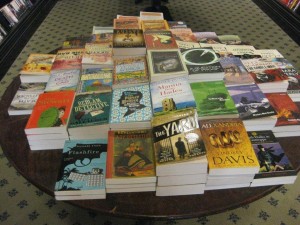Bookshops Making History: Retail Displays of Historical Fiction
by Myfanwy Cook
There are certain bookshops that, as soon as you walk past their windows, you are tempted to go in and browse. Once inside you will often find a feast of fiction, which results in you investing far more than you should in novels by authors you didn’t know existed.
Marketing has been part of the booksellers’ remit ever since the first bookshops opened their doors, and for the writers of historical fiction it is largely due to bookshops’ determination to sell books that historical fiction is now regarded by many as its own genre.
The inventiveness and creativity of a significant number of both independent and chain stores in highlighting the growing range of historical fiction deserves to be praised because it benefits both readers and authors. Some of the earliest examples of bookshops in Europe date back to the spread of the printing press. The Galignani family in France printed and distributed their own publications, including Geografia in 1597, which became a sixteenth- and seventeenth-century ‘bestseller.’ Descendants of the Galignani family still run the bookshop that, since 1856, has graced the Rue de Rivoli in Paris and today is well stocked with historical fiction.
Bookshops in Europe were often founded in university towns such as Oxford, where there was an audience of academic readers wealthy enough to invest in books. Blackwell’s (now part of the Blackwell Group) in Oxford was founded in 1879 by Benjamin Henry Blackwell. The original bookshop is still situated on Broad Street. It is an excellent example of how to showcase historical fiction writers’ novels – if you look through the classics section of the shop you will find historical fiction writers displayed alongside academic treatises. Similarly, bookshops housed in museums have now started to latch on to the idea of mixing works of historical fact and fiction on their shelves. In the basement bookshop of the National Portrait Gallery, London, the recent exhibition Elizabeth I & Her People provided the scope to display historical novels on the Tudor queen and her reign to complement the exhibits.
Towards the end of the Republic in Rome, private libraries became popular and so taberna librarii flourished. Today, in cities like Venice, the Italian book trade still promotes its collections, including its own writers of historical fiction along with writers from around the globe. The Libreria Studium, San Marco, Venice, is an example of the modern Italian bookseller trying to encourage historical fiction writers. Similarly, the Ark, Bok Handel in Tromsø, Norway, displays its own home-grown talent alongside foreign historical novelists in translation.
By their sheer elegance, certain bookshops automatically lend themselves to showcasing historical fiction. One of these is Waterstones on Princes Street, Edinburgh, which has a stunning view of the Castle, and another is in Budapest, Hungary. There the magnificent Alexandra bookshop on Andrássy Avenue is housed in an Art Nouveau (Art Szecesziós) building with its Bookcafé, which is rather like a ballroom in the Renaissance style, decorated with romantic-style frescos painted by Károly Lotz.
However, it is Hatchard’s bookshop, founded in 1797 by John Hatchard in Piccadilly, London, which is today at the forefront of promoting historical fiction, in keeping with its status as the oldest bookshop still in existence in England. It has a wonderful collection of historical fiction, subdivided into themed shelves such as historical crime, naval fiction and military fiction. It also devotes table displays to new releases in different sub-genres, often with eye-catching titles such as ‘Dastardly Daredevil Georgians.’
Many small independent bookshops also try their hardest to highlight the work of established and new historical fiction writers. Book Stop, my own local bookshop in Tavistock, regularly organises book-signing events and, despite its hobbit-like proportions, hosts book launches as well.
The HNS team would be delighted to hear all about your favourite bookshops (bookstores) anywhere in the world and why you love them.
About the contributor: Myfanwy Cook is an intrepid traveller in search of historical bookshops and a member of the HNR editorial team.
______________________________________________
Published in Historical Novels Review | Issue 67, February 2014








